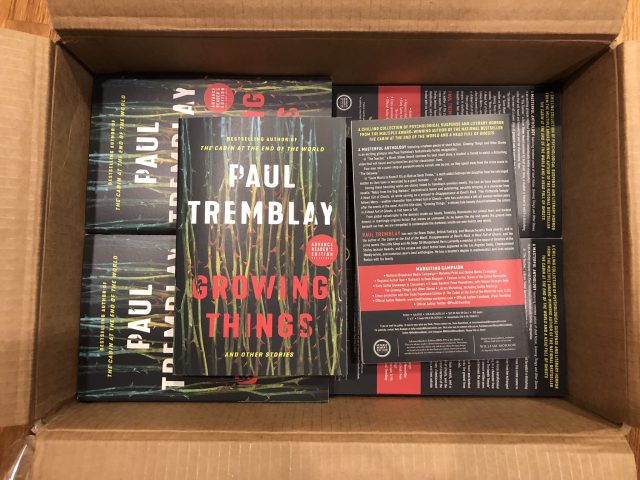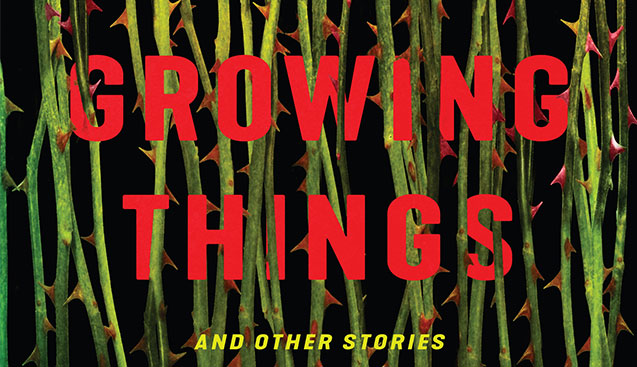As a longtime fan of the horror genre who’s just ‘recently’ gotten back into reading within the last year and a half, I’m always on the lookout for new author and book recommendations. One such tip led me to Paul Tremblay and his Exorcist-inspired novel, A Head Full of Ghosts, which I read and enjoyed a couple of winters ago. After liking that particular story and its takes on mental illness, potential possession, today’s always-on world and society as a whole, I moved on to his next novel, Disappearance at Devil’s Rock, and enjoyed that too. Then, as longtime readers may remember, I reviewed his last book, The Cabin at the End of the World.
All three novels were good and above average, making them easy to recommend. My only real complaint is that the first two didn’t pay off as much — in terms of horror — as I had hoped. Their stories were good and interesting, but they started off a lot scarier than they ended.
This spring, I received an email asking me if I’d like to review Mr. Tremblay’s next effort, and to be honest it came out of the blue. Despite being a fan, I had no idea that the author was working on and releasing a collection of shorts called Growing Things and Other Stories. Needless to say, the surprise was a pleasant one.
Growing Things and Other Stories is a collection of nineteen short stories, quite a few of which were written in previous years and appeared in miscellaneous publications. Together, they form a very interesting, unsettling, disturbing and unforgettable tome that will stay with you for some time.
This collection takes its name from its titular tale, which will be familiar to those who’ve read A Head Full of Ghosts. Said short places that particular novel’s main characters, Merry and Marjorie, inside of a story that was talked about and briefly told within its pages. That is, the fable of the ‘growing things’ which have overtaken the world around the girls’ home and threaten to make their way into the safety of their abode. The world is in chaos, nothing seems to stop the strange plants and their vines from continually growing, and there is almost nowhere to hide.

Of course, that’s just one of nineteen tales told within this book. It’s also not the only one featuring Merry and Marjorie, as the concluding fable, ‘The 13th Temple,’ also stars the two sisters. Like ‘Growing Things’ it’s odd, unsettling and unique, and is unlike most stories you’ll have read. Both are pretty ambiguous too, leaving things up to the imagination as Paul Tremblay likes to do. Sometimes I like this technique, but at other times I wish there was more clarity to the events found within some of his novels and stories. Leaving things up to the reader’s imagination can be very effective, but on the other hand us readers pine to know exactly what is going on, or what happened to the characters after we left them in their strange predicament.
The other shorts found within Growing Things and Other Stories are about a large variety of things, but they all have some aspects in common. They’re all odd and unsettling, they’re all unique and they all leave you feeling strange while wondering what the hell you just read.
Perhaps the most awarded story in this collection is ‘The Teacher,’ a tale about a popular schoolteacher who instills his students with knowledge of the world through abnormal methods. Instead of following the curriculum, Mr. Sorent shows the teens in his classroom videos depicting war, violence, oppression and, most notably, a boy whose teacher has picked him up and thrown him at a wall for misbehaving. However, instead of showing the full video at once, the teacher displays a frame at a time, and sometimes doesn’t return to the abusive montage for days or weeks.
The Teacher is a strange and unsettling story to say the least, especially since its classroom setting (and its weird events) are told in conjunction with an account of one student’s troubled home life. While it’s not my favourite story in the set, it may stick with me the most.
If I were asked to pick a favourite, I would probably have to go with ‘It’s Against the Law to Feed the Ducks,’ because it gripped me and stood out for a number of reasons. Going in, I had no idea of what to expect from the story, given its odd title, and was surprised when it hinted at a potential apocalypse. Although this was another ambiguous short, it was well written, had an interesting perspective and really made me think, which I appreciated. It also had a very unique set-up, and characters who acted in believable ways.

Other standouts include a tale about a drug addicted cashier who wants to save her estranged daughter from world destroying monsters, a choose-your-own-adventure about an elderly woman who returns to her family’s former home in order to face the ghosts of her past, a strange story about an ice tower that puzzles experts and mountain climbers alike, and a neat one about a getaway driver and his fellow criminals. Those, plus an unnamed fable in which a man and his kids are met at a pool by a woman who isn’t their wife or mother, yet pretends to be her and casts some sort of spell on them.
Hell, there’s even a story featuring Hellboy, which was written for Mike Mignola.
I also truly appreciated the mature way in which Paul Tremblay handled heavy topics through theses stories. Things like loss, grief, depression and mental illness, as well as facing one’s past and moving on from it. He did an excellent job of tackling such mature subjects throughout.
Of course some stories were better than others, but that’s how it always is with this kind of collection. Some tales are simply better than others, and certain ones will appeal to different people for various reasons. It’s normal. Thus, I won’t pretend that I loved every tale found within this trade paperback (which will be released in hardcover fashion on July 2nd), though there weren’t any that I didn’t like. Some were simply better than others, and certain ones were great. As such, this has quickly become one of my favourite short story collections, joining Joe Hill’s 20th Century Ghosts, Stephen King’s Everything’s Eventual and Ray Bradbury’s The October Country.
If you’re familiar with this author’s previous works, then it won’t surprise you to read that Growing Things and Other Stories is a well written collection. It certainly is, and the quality of the writing helps the stories excel. We received an Advanced Reading Copy, though, and it contained a handful of spelling, spacing and duplicate word errors. They’ve likely been ironed out of the retail release.
Don’t hesitate to pick up Paul Tremblay’s Growing Things and Other Stories this summer, or whenever you get a chance, because it’s a great way to get one’s horror and short story fix. With these nineteen assorted tales, the author sparks the reader’s imagination and plants things inside their brains that they won’t soon forget. I mean that in a good way, of course.
**This review is based on an ARC that we were provided with by the publisher.**

